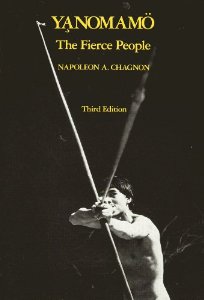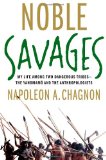(L-R) Daniel C. Dennett, Napoleon Chagnon, David Haig, Steven Pinker, Richard Wrangham, John Brockman
"Napoleon Chagnon is a Living World Treasure. Arguably our greatest anthropologist ..." — Richard Dawkins, from the Introduction
Thanks to Steven Pinker for initiating and facilitating this Edge Special Event with Napoleon Chagnon, the last of the great ethnographers.
THE REALITY CLUB: Lionel Tiger, Paul Seabright, Dominic Johnson, Azar Gat, Daniel Everett
INTRODUCTION
By Richard Dawkins
Chagnon's extraordinary body of work will long be mined, not just by anthropologists but by psychologists, humanists, litterateurs, scientists of all kinds: mined for . . . who knows what insights into the deep roots of our humanity?
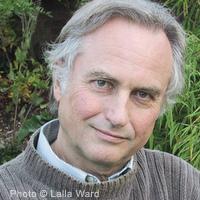 Napoleon Chagnon is a Living World Treasure. Arguably our greatest anthropologist, he is brave on two fronts. As a field worker in the Amazon forest he has lived, intimately and under conditions of great privation, with The Fierce People at considerable physical danger to himself. But the wooden clubs and poison-tipped arrows of the Yanomamö were matched by the verbal clubs and toxic barbs of his anthropologist colleagues in the journal pages and conference halls of the United States. And it is not hard to guess which armamentarium was the more disagreeable to him.
Napoleon Chagnon is a Living World Treasure. Arguably our greatest anthropologist, he is brave on two fronts. As a field worker in the Amazon forest he has lived, intimately and under conditions of great privation, with The Fierce People at considerable physical danger to himself. But the wooden clubs and poison-tipped arrows of the Yanomamö were matched by the verbal clubs and toxic barbs of his anthropologist colleagues in the journal pages and conference halls of the United States. And it is not hard to guess which armamentarium was the more disagreeable to him.
Chagnon committed the unforgivable sin, cardinal heresy in the eyes of a certain kind of social scientist: he took Darwin seriously. Along with a few friends and colleagues, Chagnon studied the up-to-date literature on natural selection theory, and with brilliant success he applied the ideas of Fisher, Hamilton, Trivers and other heirs of Darwin to a human tribe which probably ran as close to the cutting edge of natural selection as any in the world. It is sobering to reflect on how unconventional a step this was: science bursting into the quasi-literary world of the anthropology in which the young Chagnon was trained. Still today, in many American departments of social science, for a young researcher to announce a serious interest in Darwin's dangerous idea—even an inclination towards scientific thinking at all—can come close to career suicide.
In Chagnon's case the animosity spilled over from mere academic disagreement to personal slander, which was not merely untrue but diametrically opposite to the truth about this ethnographer and his decent and humane relationship with his subjects and friends. The episode serves as a dark lesson in what can happen when ideology is allowed to poison the well of academic study. While it is thankfully in the past, it blighted Chagnon's career, and I don't know whether the lesson for social science has been adequately learned.
Chagnon came along at just the right time for the Yanomamö and for scientific anthropology. Encroaching civilisation was about to close the last window on a tribal world that embodied vanishing clues to our own prehistory: a world of forest "gardens", of kin-groups fissioning into genetically salient sub-groups, of male combat over women and trans-generational revenge, complex alliances and enmities; webs of calculated obligation, debt, grudge and gratitude that might underlie much of our social psychology and even law, ethics and economics. Chagnon's extraordinary body of work will long be mined, not just by anthropologists but by psychologists, humanists, litterateurs, scientists of all kinds: mined for . . . who knows what insights into the deep roots of our humanity?
In his unique role as salon-host and impresario for science, John Brockman has performed what will come to be seen as an enduring service, by bringing Napoleon Chagnon together with four of today's leading Third Culture intellectuals: Daniel Dennett, Steven Pinker, Richard Wrangham and David Haig. Separately and in teams, these penetrating minds, combining deep scholarship with a rare ability to communicate and entertain, converse with Napoleon Chagnon and shed and reflect light on the life-work of a great anthropologist and a brave man.
—Richard Dawkins
RICHARD DAWKINS, evolutionary biologist, is Emeritus Professor of the Public Understanding of Science, Oxford; Author, The Greatest Show on Earth; The Selfish Gene. He was recently ranked #1 in Prospect Magazine's poll of "World Thinkers 2013."
PART ONE: NAPOLEON CHAGNON & STEVEN PINKER (WITH DANIEL C. DENNETT & DAVID HAIG)
I first walked into the Yanomamö village thinking I was going to do the perfunctory one-year field research or maybe less, go back to my university, write my doctoral dissertation, publish a book maybe, after two or three years of thinking about it, then return to the tribe ten years later and do the expected thing about, "Woe is me, what has the world and technology done to my people?" But the minute I walked into my first Yanomamö village I realized that I was witnessing a really precious thing, and I knew I would have to come back again and again. And I did.
 [1:00:58]
[1:00:58]
DISCUSSION: CHAGNON, PINKER, DENNETT, HAIG
The Yanomamö are very valuable now as a commodity. They are the largest most interesting and romanticized tribe in the entire Amazon basin, maybe in the world. They live in an area that is threatened by ecological destruction, so there are people who are interested in saving the rain forest, and people who are interested in saving the natives. And these groups collaborate with each other. Everybody wants the Yanomamö in their portfolio.
 [30:43]
[30:43]
PART TWO: NAPOLEON CHAGNON & RICHARD WRANGHAM (WITH DANIEL C. DENNETT & DAVID HAIG)
What I've discovered is that life was very much filled with terror of your neighbors, constantly in a position—sort of like Hobbes’ argument—foul weather is not a shower or two but a tendency thereto for months on end. So you always have your eye open to the frontier and try to make sure that the guys out there are on the other side of the moat.

[33:52]
Continue to Part Two
DISCUSSION: CHAGNON, WRANGHAM, DENNETT, HAIG
Big villages lord over small villages. So if you're seeking an ally who will protect you from the buggers up the hill who are bigger than you, you're at a disadvantage because in order to get allies, you've got to give women to them. It’s an economics game where the smaller village has to pay up front for the privileges of the alliance, and the bigger village tends to default on many of its agreements. So big villages tend to exploit small villages. It's always a good idea to live in a big village; however, it's like living in a powder keg.

[20:47]
Continue to Part Two Discussion
NAPOLEON CHAGNON is a renowned anthropologist who is most widely recognized for his study of the Yanomamö tribes in the Amazon. He is a professor of anthropology at the University of Missouri; Author, Noble Savages: My Life Among Two Dangerous Tribes—the Yanomamö and the Anthropologists.
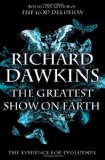

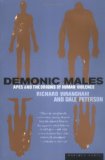

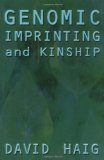
STEVEN PINKER, psychologist, is Johnstone Family Professor, Department of Psychology; Harvard University; Author, The Better Angles of Our Nature: Why Violence Has Declined; The Blank Slate: The Modern Denial of Human Nature.
RICHARD WRANGHAM is Ruth Moore Professor of Biological Anthropology, Curator of Primate Behavioral Biology at Harvard University; Author, Catching Fire: How Cooking Made Us Human; (coauthor) Demonic Males: Apes, and the Origins Of Human Violence.
DANIEL C. DENNETT is Austin B. Fletcher Professor of Philosophy, & Co-Director, Center for Cognitive Studies, Tufts University; Author, Intuition Pumps and Other Tools for Thinking; Darwin's Dangerous Idea: Evolution and the Meanings of Life.
DAVID HAIG, evolutionary geneticist/theorist, is Associate Professor of Biology in Harvard's Department of Organismic and Evolutionary Biology, with an interest in conflicts and conflict resolution within the genome, and genomic imprinting and relations between parents and offspring; Author, Genomic Imprinting and Kinship.







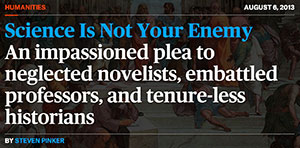
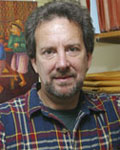
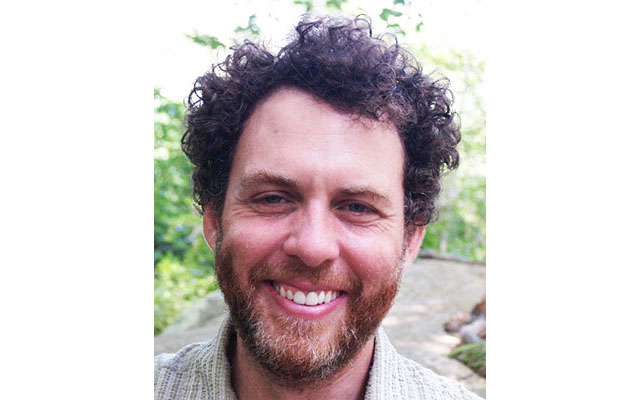

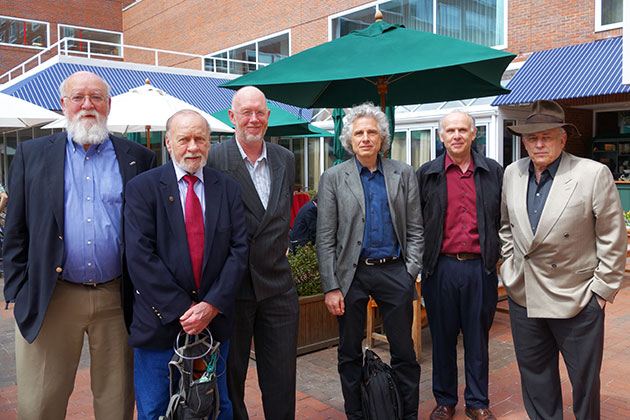
 Napoleon Chagnon is a Living World Treasure. Arguably our greatest anthropologist, he is brave on two fronts. As a field worker in the Amazon forest he has lived, intimately and under conditions of great privation, with The Fierce People at considerable physical danger to himself. But the wooden clubs and poison-tipped arrows of the Yanomamö were matched by the verbal clubs and toxic barbs of his anthropologist colleagues in the journal pages and conference halls of the United States. And it is not hard to guess which armamentarium was the more disagreeable to him.
Napoleon Chagnon is a Living World Treasure. Arguably our greatest anthropologist, he is brave on two fronts. As a field worker in the Amazon forest he has lived, intimately and under conditions of great privation, with The Fierce People at considerable physical danger to himself. But the wooden clubs and poison-tipped arrows of the Yanomamö were matched by the verbal clubs and toxic barbs of his anthropologist colleagues in the journal pages and conference halls of the United States. And it is not hard to guess which armamentarium was the more disagreeable to him.
